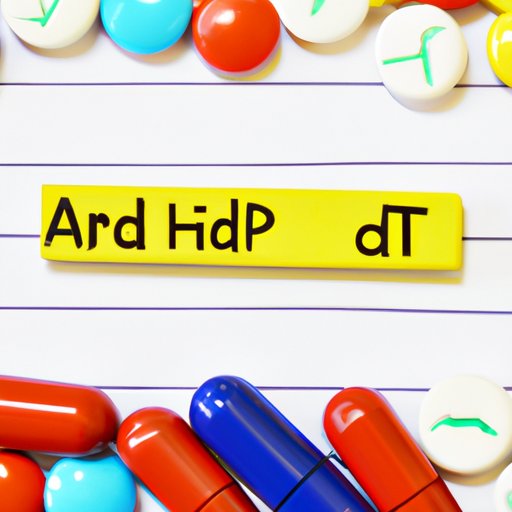Introduction
ADHD is a neurodevelopmental disorder characterized by inattention, hyperactivity, and impulsivity. It affects about 5-10% of children and 2-5% of adults worldwide. Despite its prevalence, ADHD often goes undiagnosed or misdiagnosed. Proper diagnosis is important for accessing appropriate treatment and accommodations, improving self-awareness, and avoiding unnecessary treatments. This article provides a comprehensive guide on how to get tested for ADHD.
How to Get Tested for ADHD
Step 1: Finding a Qualified Professional
The first step in getting tested for ADHD is finding a qualified professional who specializes in the disorder. This can include psychiatrists, psychologists, or other mental health professionals who are trained to diagnose and treat ADHD. One way to find a qualified professional is to ask for a referral from your primary care physician or another healthcare provider. You can also search online for providers in your area who specialize in ADHD.
Step 2: Preparing for the Evaluation
Before the evaluation, it is important to prepare yourself or your child for the process. This may involve filling out questionnaires, gathering medical records, and considering bringing a support person such as a family member or friend. It is also important to inform the professional of any current medications or supplements being taken, as well as any relevant medical or mental health history.
Step 3: Understanding the Different Tests Involved
The evaluation for ADHD typically involves a combination of self-assessment questionnaires, diagnostic interviews, and cognitive tests. The purpose of these tests is to determine the presence and severity of symptoms, as well as rule out other potential causes of the symptoms. Some commonly used tests include:
- Conners’ Rating Scales: A series of questionnaires filled out by the individual, their family members or teachers to assess ADHD symptoms and their severity.
- ADHD Rating Scale: A similar tool to Conners’ rating scales to assess ADHD symptoms and their severity.
- Clinical Interviews: A series of questions asked by the professional to assess ADHD symptoms and rule out other potential causes of the symptoms.
- QbTest: A computerized test that measures attention and impulsivity through the use of sensors.
Overview of ADHD Tests
Each type of ADHD test has its own set of pros and cons. Self-assessment questionnaires are easy to administer and provide a subjective view of symptoms but can be biased due to factors such as social desirability. Clinical interviews are more comprehensive but may be affected by the interviewer’s biases or the individual’s willingness to disclose information. Cognitive tests are objective but may not accurately reflect everyday functioning. The decision on which test to use ultimately depends on the individual’s unique situation and the professional’s opinion. It is important to discuss the options and potential outcomes with the professional before proceeding with any testing.
Benefits of Proper Diagnosis
Proper diagnosis of ADHD has many benefits, including access to appropriate treatment and accommodations, improved self-awareness and understanding of one’s strengths and weaknesses, and avoidance of misdiagnosis and unnecessary treatments.
Access to Treatment and Accommodations
With proper diagnosis, individuals with ADHD can access various treatment options such as medication, therapy, and behavioral interventions. These treatments can help manage symptoms and improve quality of life. Additionally, individuals with ADHD may be eligible for accommodations such as extended time on tests, preferential seating, or modified work tasks to help them function more effectively in their daily lives.
Improved Self-Awareness and Understanding
Proper diagnosis can also lead to improved self-awareness and understanding of one’s strengths and weaknesses. This can help individuals with ADHD better manage their symptoms and improve their overall functioning. Understanding one’s own ADHD can also improve relationships with others, particularly family members and peers who may not fully understand the disorder.
Avoidance of Misdiagnosis and Unnecessary Treatments
Without proper diagnosis, individuals with ADHD may be misdiagnosed with other disorders such as depression, anxiety, or bipolar disorder. This can lead to unnecessary treatments that may not effectively manage ADHD symptoms. Proper diagnosis can help avoid misdiagnosis and ensure that individuals receive appropriate treatments.
Tips for Preparing for ADHD Evaluation
Preparing for the ADHD evaluation can help ensure a more accurate and thorough diagnosis. Some tips for preparing for the evaluation include:
- Keeping a symptom journal to track symptoms and behaviors
- Bringing along relevant medical history and records, such as previous evaluations or medication records
- Considering bringing a family member or friend for support during the evaluation process
Common Myths and Misconceptions about ADHD Testing
There are many myths and misconceptions surrounding ADHD, and it is important to address these with your doctor or mental health professional. Some common myths about ADHD testing include:
- ADHD only affects children
- Medication is always the answer for ADHD
It is important to note that ADHD can affect individuals of all ages, and while medication can be an effective treatment option, it is not the only option. There are also various non-medication treatments such as therapy, behavioral interventions, and lifestyle changes that can help manage symptoms.
Personal Stories and Testimonials
Personal stories and testimonials can provide valuable insight and advice for individuals seeking ADHD diagnosis and treatment. Some individuals may feel isolated or unsure about seeking help, but hearing from others who have gone through the process can be reassuring and motivating.
Conclusion
Getting tested for ADHD can be an important step in managing symptoms and improving overall functioning. Finding a qualified professional, understanding the different tests involved, and preparing for the evaluation can help ensure a more accurate and thorough diagnosis. It is also important to address common myths and misconceptions about ADHD and seek support from personal networks and mental health professionals. Proper diagnosis can lead to access to appropriate treatments and accommodations, improved self-awareness and understanding, and avoidance of misdiagnosis and unnecessary treatments.
